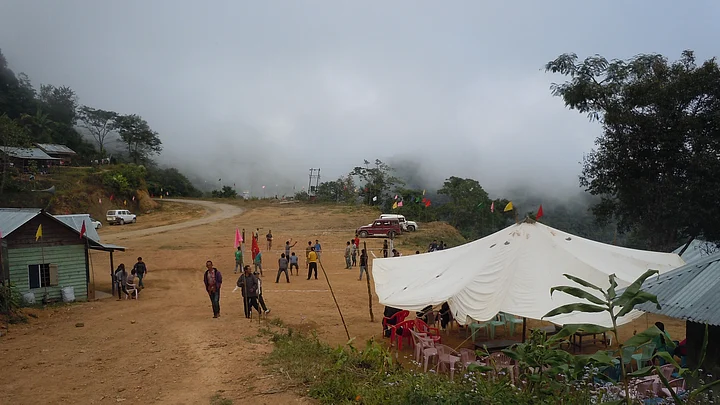On the morning of June 4, 20 soldiers of the 6th Dogra infantry regiment of the Indian Army were killed in an ambush not far from the India-Myanmar border in Manipur’s Chandel district.
While militant-related violence has been on the rise in India’s northeast in recent weeks, this one was exceptionally daring and gruesome. The gunmen, who are now suspected to be insurgents belonging to the Meitei militant outfit Kanglei Yawol Kanna Lup (KYKL) and the National Socialist Council of Nagaland (Khaplang), rained rocket-propelled grenades on a convoy of four army vehicles, carrying approximately over three dozen soldiers, at a section of the Samtal Road. If reports are to be believed, ‘daos’ (or machetes) were used to finish the job. A dozen injured soldiers were airlifted for emergency medical care.
Three militant groups – KYKL, NSCN(K) and Kangleipak Communist Party – have owned up to the attack. But the desperation, according to a security expert, points to the possible fallout of the breakdown of ceasefire talks between New Delhi and the NSCN(K), headed by the Burmese Naga, S S Khaplang.
“If you fail to continue the ceasefire, you have to be prepared for the fire. The alternative to ceasefire is only to fight,” the official, who requested anonymity, said.
Did Ceasefire Talks Backfire?
The ceasefire framework, designed to negotiate peace with militant groups, has long been criticised by various militant groups because of the unilateral talks New Delhi holds with – only – NSCN’s Isak-Muivah faction. Khaplang’s group is considered ‘Burmese’ and therefore, untouchable.
Typically, ceasefire agreements are held and signed between home ministry officials and representative militant groups. Till at least 2013, the Naga Ceasefire Monitoring Group, composed of an ex-army officer, central and state officials, and members of militant groups, met every quarter “near Dimapur”, possibly at Muivah’s headquarters, then-called by the Old Testament name of Camp Hebron.
Despite repeated requests from Khaplang to be included in Naga resolution talks, the government has been uncertain on which faction of his group to speak to: the group has splintered. Khaplang has now formed a rainbow militant group from across northeastern states called the United Liberation Front of Western South East Asia (ULFWSEA).
The government was also unsure about the consequences of inviting Khaplang to the negotiating table – whether to risk the 15-year peace talks on with the Muivah faction by calling its bête noire on board (Muivah and Khaplang fell out violently in 1988), leaving many corpses in its wake.
The Naga Dominance Predicament
Of late, Muivah has become a shadow politician of sorts, calling the shots in selection of Naga People’s Front candidates in assembly and local elections both in Nagaland and Manipur. His men also “control” elections in far-flung places like Senapati and Chandel regions of Manipur, ‘selecting’ candidates.
During my visit to Senapati and Chandel, people spoke about the dominance of Tangkhuls, Muivah’s Naga tribe. Many Poumai Nagas feel they’re treated as second class citizens in the Naga edifice, a modern construct of many tribes coming together under Phizo’s banner of ‘Nagaland for Christ’.
Khaplang, a resident of Burma, may not have such a wide base as Muivah, and counts among his supporters many impoverished Burmese immigrants that successive state governments in Nagaland have freely allowed in, but ignored. The mistreatment of the Nagas on the Burmese side at the hands of NSCN has been summarised by Bertil Lintner’s 2012 ‘Great Game East’.
The bedrock of Naga dominance dictated by an unelected group is crumbling, as people are tired of paying ‘taxes’ to militant factions, unending bandhs and violence. Young people would rather migrate elsewhere for jobs and opportunities.
New Delhi is clueless, but does not take state governments into confidence: it believes a remote button can do the job. Earlier this week, Nagaland chief minister T R Zeliang, after meeting Prime Minister Narendra Modi in New Delhi, issued a press release, saying that the March scrapping of the ceasefire between the NSCN(K) and the Centre happened without “any consultation or formal intimation” with him.
The government, along with Naga civil organisations he said, wants New Delhi to “reconsider the abrogation of the ceasefire pact so that the on-going peace process is not disturbed”. Whose shadow lurks over his words?
(Maitreyee Handique writes on the North East and keeps a close watch on labour, industrial safety and human rights issues.)
(At The Quint, we question everything. Play an active role in shaping our journalism by becoming a member today.)
